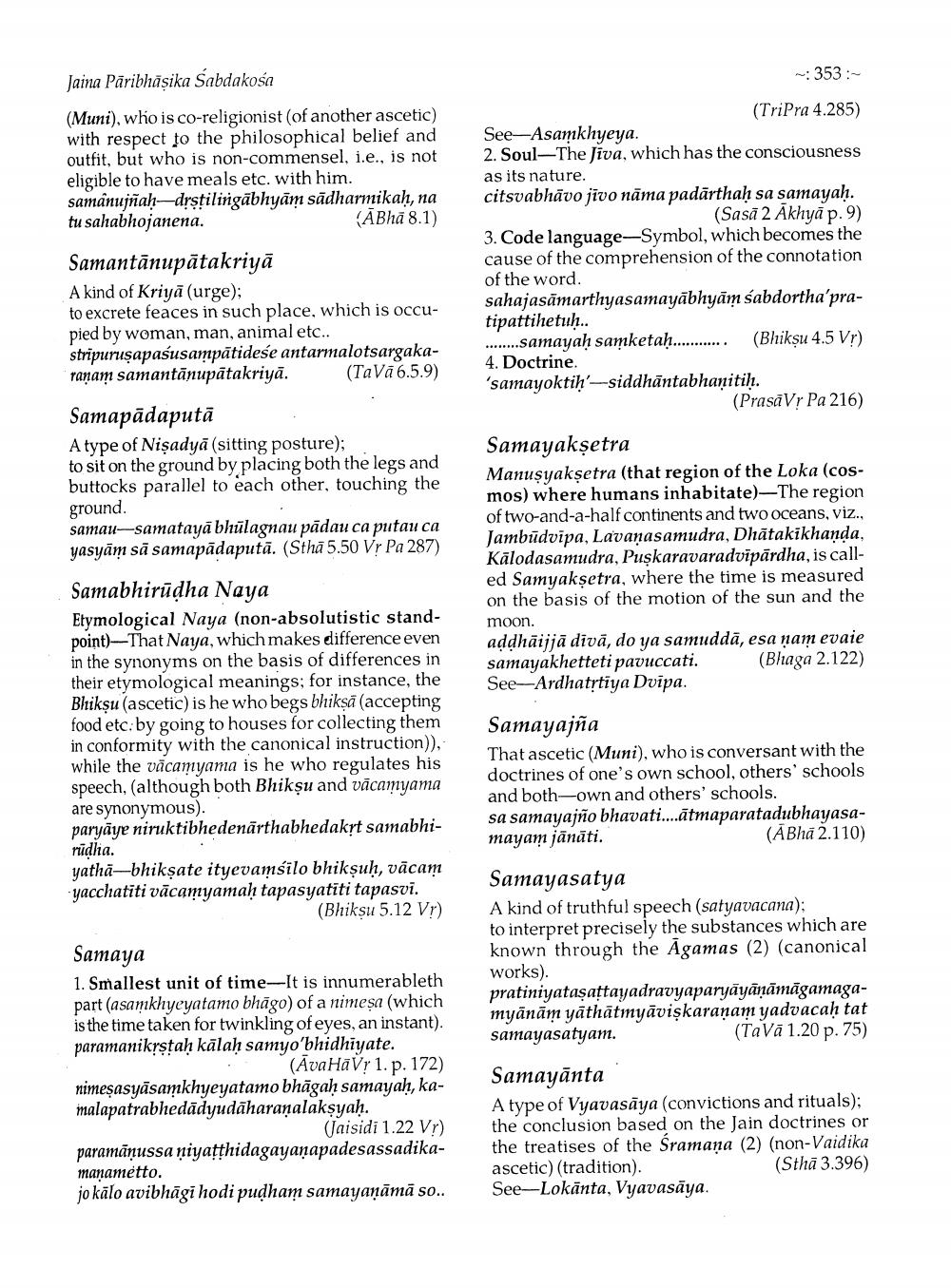________________
Jaina Paribhasika Sabdakosa
(Muni), who is co-religionist (of another ascetic) with respect to the philosophical belief and outfit, but who is non-commensel, i.e., is not eligible to have meals etc. with him. samanujñaḥ drstilingabhyan sädharmikaḥ, na tu sahabhojanena. (ABhd 8.1)
Samantänupätakriya
A kind of Kriya (urge):
to excrete feaces in such place, which is occupied by woman, man, animal etc.. stripuruşapasusampätidese antarmalotsargakaraṇam samantānupätakriyā. (Tavā 6.5.9)
Samapädapută
A type of Nisadya (sitting posture); to sit on the ground by placing both the legs and buttocks parallel to each other, touching the ground.
samau-samataya bhülagnau padau ca putau ca yasyam så samapadaputa. (Stha 5.50 Vr Pa 287)
Samabhirudha Naya
Etymological Naya (non-absolutistic standpoint)-That Naya, which makes difference even in the synonyms on the basis of differences in their etymological meanings; for instance, the Bhiksu (ascetic) is he who begs bliks (accepting food etc. by going to houses for collecting them in conformity with the canonical instruction)).while the vacanyama is he who regulates his speech, (although both Bhiksu and vacanyama are synonymous).
paryaye niruktibhedenärthabhedakṛt samabhirudha.
yatha-bhiksate ityevamsilo bhiksuḥ, vācam yacchatiti vacamyamah tapasyatiti tapasvi. (Bhiksu 5.12 Vr)
Samaya
1. Smallest unit of time-It is innumerableth part (asankhyeyatamo bhago) of a nimesa (which is the time taken for twinkling of eyes, an instant). paramanikṛṣṭaḥ kälaḥ samyo'bhidhiyate. (AvaHaVṛ 1. p. 172) nimeṣasyasamkhyeyatamo bhagaḥ samayaḥ, kamalapatrabhedadyudaharaṇalakṣyah.
(Jaisidi 1.22 Vr) paramanussa niyaṭṭhidagayanapadesassadikamaṇametto.
jo kalo avibhagi hodi pudham samayaṇāmā so...
~:353:~
(TriPra 4.285)
See-Asamkhyeya.
2. Soul-The Jiva, which has the consciousness as its nature.
citsvabhavo jivo nama padarthaḥ sa samayah. (Sasa 2 Akhya p.9) 3. Code language-Symbol, which becomes the cause of the comprehension of the connotation of the word.
sahajasamarthyasamayabhyam sabdortha'pra
tipattiletul...
........samayaḥ samketah
(Bhiksu 4.5 Vr)
4. Doctrine.
'samayoktiḥ-siddhantabhaṇitiḥ,
(PrasaVr Pa 216)
Samayakşetra
Manusyakṣetra (that region of the Loka (cosmos) where humans inhabitate)-The region of two-and-a-half continents and two oceans, viz., Jambudvipa, Lavanasamudra, Dhatakikhaṇḍa, Kalodasamudra, Puskaravaradvipärdha, is called Samyakşetra, where the time is measured on the basis of the motion of the sun and the
moon.
addhāijjā diva, do ya samudda, esa nam evaie samayakhetteti pavuccati. (Bhaga 2.122) See-Ardhatṛtiya Dvipa.
Samayajña
That ascetic (Muni), who is conversant with the doctrines of one's own school, others' schools and both-own and others' schools.
sa samayajno bhavati....atmaparatadubhayasamayam jānāti.
(ABhā 2.110)
Samayasatya
A kind of truthful speech (satyavacana); to interpret precisely the substances which are known through the Agamas (2) (canonical works).
pratiniyataşattayadravyaparyāyāṇāmāgamagamyanam yathatmyaviṣkaraṇam yadvacaḥ tat samayasatyam. (TaVa 1.20 p. 75)
Samayanta
A type of Vyavasaya (convictions and rituals): the conclusion based on the Jain doctrines or the treatises of the Sramana (2) (non-Vaidika ascetic) (tradition). (Stha 3.396) See-Lokanta, Vyavasaya.




